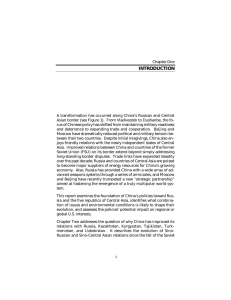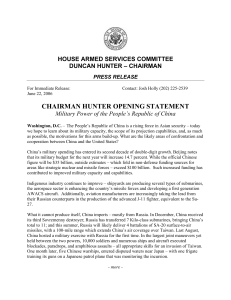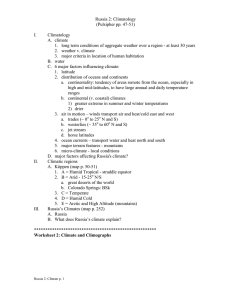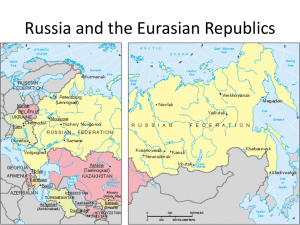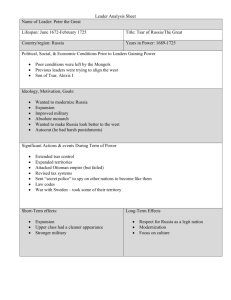IMPLICATIONS FOR U.S. INTERESTS
advertisement
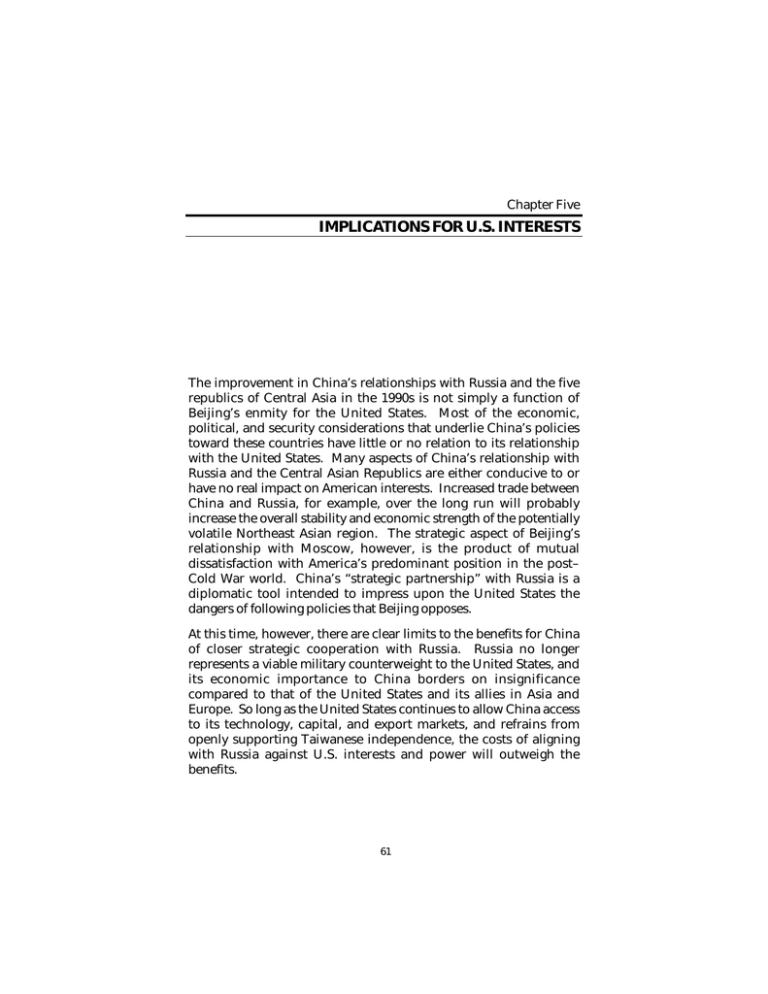
Chapter Five IMPLICATIONS FOR U.S. INTERESTS The improvement in China’s relationships with Russia and the five republics of Central Asia in the 1990s is not simply a function of Beijing’s enmity for the United States. Most of the economic, political, and security considerations that underlie China’s policies toward these countries have little or no relation to its relationship with the United States. Many aspects of China’s relationship with Russia and the Central Asian Republics are either conducive to or have no real impact on American interests. Increased trade between China and Russia, for example, over the long run will probably increase the overall stability and economic strength of the potentially volatile Northeast Asian region. The strategic aspect of Beijing’s relationship with Moscow, however, is the product of mutual dissatisfaction with America’s predominant position in the post– Cold War world. China’s “strategic partnership” with Russia is a diplomatic tool intended to impress upon the United States the dangers of following policies that Beijing opposes. At this time, however, there are clear limits to the benefits for China of closer strategic cooperation with Russia. Russia no longer represents a viable military counterweight to the United States, and its economic importance to China borders on insignificance compared to that of the United States and its allies in Asia and Europe. So long as the United States continues to allow China access to its technology, capital, and export markets, and refrains from openly supporting Taiwanese independence, the costs of aligning with Russia against U.S. interests and power will outweigh the benefits. 61 62 Chinese Policy Toward Russia and the Central Asian Republics Over time this equation may change. As China’s economic, political, and military power continues to grow, it may no longer consider U.S. economic resources crucial to its development or U.S. acquiescence vital to reunification. Under these conditions, China may seek to actively cooperate with Russia or other willing countries to undermine America’s regional or global influence. At the same time, however, tensions arising from issues inherent in the Sino-Russian bilateral relationship discussed earlier in this report will increasingly impede closer cooperation between Beijing and Moscow. Geographic proximity and the growing disparity in national power suggest that Russia’s concerns with the rising Chinese power will eventually outweigh its concerns with the established American power. China’s relationships with the countries of Central Asia do not carry the same potential threat to U.S. interests as its relationship with Russia does. In many ways, China’s role in Central Asia actually complements U.S. policy goals for the region. China is a force against Islamic radicalism and supports the establishment of stable, secular regional regimes. The expansion of oil pipelines and other transport routes from Central Asia through China is essential to the region’s economic development and, over the longer term, transition from imperial possessions to independent and viable nation-states. Moreover, China is only one of a number of economic and political actors in Central Asia. While its presence in the region is significant and growing, it is very unlikely that China will be able to negatively impact U.S. interests in any meaningful way for the foreseeable future. China’s support for the extension of pipeline routes from Central Asia through Iran has the potential to generate conflict between Beijing and Washington. As described earlier, China’s recent oil agreement with Kazakhstan included a Chinese pledge to help construct a pipeline from Kazakhstan to the Kazakh-Turkmen border, with the goal of eventually extending through to an Iranian port. This would run counter to the current U.S. policy of denying Iran access to Central Asian oil. U.S. officials have yet to comment on this aspect of the Sino-Kazakh agreement. Of course, this will become a nonissue should the recent thawing of U.S.-Iranian relations lead to a reappraisal of the policy in Washington. Implications for U.S. Interests 63 Serious conflict between the United States and China over Central Asia is imaginable only if Chinese actions in the region begin to restrict international access to energy resources. China has not yet demonstrated any intention, or the capability, of pursuing such a policy. As mentioned earlier, the major oil-bearing regions of Central Asia lie far from the Chinese border. It is in the interest of a number of countries, many of which have greater financial resources and relatively easier access to that area of Central Asia than China, that no single country dominates the region. China’s policies toward Russia and Central Asia are components of a broad policy intended to gradually reduce the PRC’s vulnerability to U.S. power and move the world toward a multipolar international order. China’s “strategic partnership” with Russia and growing influence in Central Asia are not only important in terms of the implications of these relationships to U.S. interests but as indicators of Beijing’s strategic view of the world and international security in the post–Cold War era. Regardless of the eventual fate of the SinoRussian “strategic partnership,” China will continue to seek counterweights in the international arena to the United States’ overwhelming economic, political, and strategic power.
